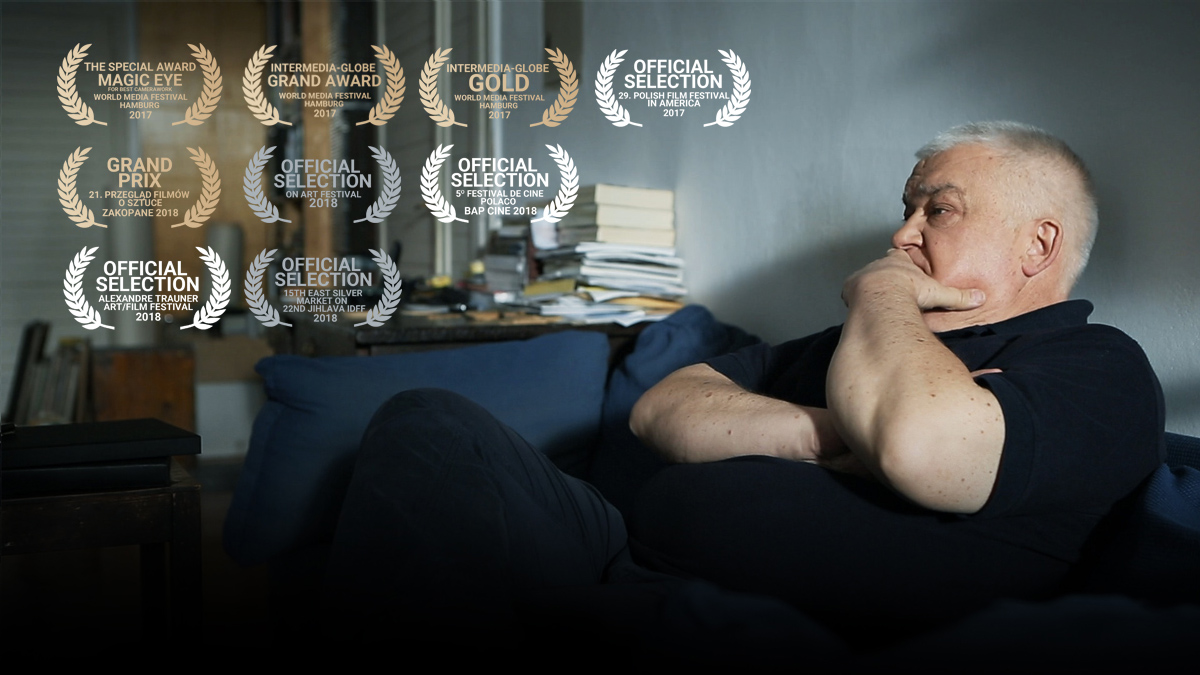Multiplying stories

‘Nobody, even the painter themselves, can explain the only thing that is really important in a painting’, wrote cubist Georges Braque. In presenting the achievements of the Krakow painter Jacek Sroka, he lets not just the painter but also – or perhaps even above all – his paintings, speak. Together with his hero, he examines them thoroughly, but he also analyses and enlivens them using cinematic means of expression, which results in a dynamic portrait of the artist, one that is far from conventional portrayals.
For, against its title, the ‘Diary of a Beholder’, although spread out over individual days of the week, offers something more than merely a chronicle or a record of the immediate reality through the eyes of its protagonist. Sroka, an avid Fernand Braudel reader, perceives historical time in terms of long term, and it is from that enhanced perspective that he talks about his works. They reflect the experience of communism, especially the martial law period, as well as the cultural transformations of the recent decades. Migoń finds a film form that is able to accommodate the artist's work both in its individual aspect, which is an expression of the anxieties and obsessions of a particular person, as well as in its collective aspect, reflecting the spirit of a certain era. He accomplishes this in the ‘Diary of a Beholder’ by constantly switching viewpoints, which at the same time reflects the intellectual liveliness of his protagonist.
Thus, we watch the painter bustling around the kitchen and revealing his painting tricks. We watch him in the family environment only to see an intriguing merger a moment later; this artist’s family life and his painting seem to be intertwined in an organic way. Hence, so much attention is devoted to the home interiors, as well as the oddities and ordinary items they hold. Jacek Sroka's private microcosm: the home, the city, the people and the animals around him, the daily rituals, turns out to be as important as the expressive macrocosm of his canvases or the brilliant and self-conscious comments about art. It is thanks to this attention to outer detail that the ‘Diary of a Beholder’ becomes an even more ‘inner’ portrait, that is: a very thorough one, one that touches the essence of what the artist himself calls ‘a miracle in painting’.
The most important thing is that Migoń does not try to format his hero by boxing him in the schemes of a correct ‘film about art’. Quite the opposite: Piotr Trela's camerawork, the music by Motion Trio’s Marcin Gałażyn or the perfectly rhythmic editing all serve to bring out all the uniqueness, sense of humour and a kind of uncontrollable nature of the person portrayed. The various techniques used by the director serve a similar purpose: In addition to documentary resources or intelligently edited archive materials, the director also uses animations, which makes it possible to take a free ‘dive’ into Sroka’s paintings or to plumb the mysteries of his ‘alchemy of colour’.
‘I almost always entitle my paintings, although they speak for themselves without any captions. Titles multiply meanings just like a film multiplies stories.’ When Jacek Sroka utters these words off-screen at the beginning of the film, the camera is filming his individual canvases from behind. In the following shots, dozens or hundreds of paintings appear, all lined up carefully, all facing away. Migoń’s documentary not only puts them in front of us, brings them as close as possible to us and allows us to hear the artist’s voice hitherto recorded in the diaries. According to his observation, the film is not limited to a mere canonical biography, but tries to multiply the artist’s story. It does not box him in a stiff frame.
Anita Piotrowska, Tygodnik Powszechny, Krakow Film Festival
Anita Piotrowska – a Tygodnik Powszechny film critic. She writes for the magazines "EKRANy", "Kino" and the psychological monthly "Charaktery". Member of FIPRESCI International Federation of Film Critics. Juror of numerous festivals in Poland and abroad (including Karlove Vary, Istanbul, Moscow, Ankara, Oberhausen, Hong Kong, Cairo, T-Mobile Nowe Horyzonty, Off Plus Camera, Planete Doc). As part of Krakow Film Festival, she co-creates its documentary programme. Winner of the Polish Film Institute award in the film critics category (2014). (Source: Tygodnik Powszechny)
Translation from polish: Mateusz Izdebski
 Projects
Projects